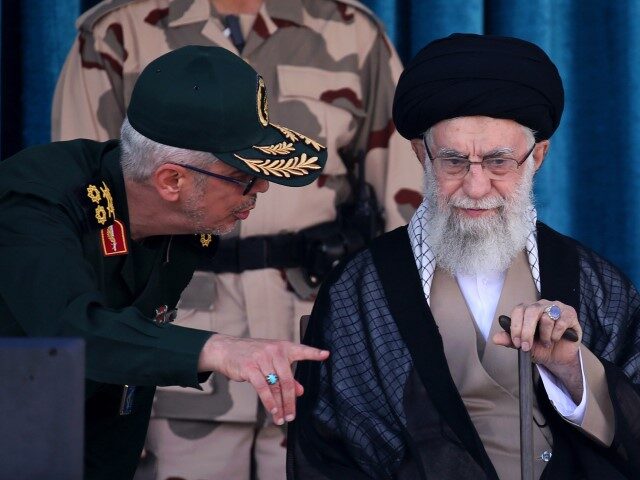Iran’s Supreme Leader, Ayatollah Ali Khamenei, offered fulsome praise on Sunday for the late President Ebrahim Raisi as a means of laying down the law for his replacement, “moderate” President-Elect Masoud Pezeshkian.
The powerful Iranian military announced it was ready to work with Pezeshkian, which is better understood as a way of saying he had better be ready to work with them.
Pezeshkian was declared the winner of a runoff election against hard-line cleric Saeed Jalili on Saturday, besting him by 3 million votes in an election that had much higher turnout than the first round of voting a week earlier.
Iranian Armed Forces Chief of Staff Mohammad Baqeri on Sunday praised the high turnout for the runoff as a “scintillating” victory for the Iranian system and a demonstration of national unity.
This will doubtless sound like fingernails on a blackboard to Iranian opposition leaders and human rights activists who advised their supporters to boycott the election, precisely because low turnout would embarrass the regime more than a supposed “moderate” defeating the Ayatollah’s protege.
Turnout for the second round surged as Iranian voters concluded Pezeshkian had a good chance of winning, but it soon became unclear exactly what they expect this reformist president to reform. The supreme leader holds all the real power and controls most of Iran’s wealth, while the theocratic wing of the Iranian military, the Islamic Revolutionary Guard Corps (IRGC), controls much of Iran’s foreign policy and has demonstrated a willingness to kill citizens who demand major changes to the system.
Supreme Leader Khamenei’s fond remembrance on Sunday of Raisi’s government – viewed by most Iranians, and probably almost all Pezeshkian voters, as an unmitigated disaster – was difficult to interpret as anything but a warning to the incoming reformist president.
Khamenei praised Raisi for his obedience to the Iranian clergy, expressed through his “religious and revolutionary positions.”
“Among the distinctive characteristics of Martyr Raisi was his diligence, and round-the-clock efforts,” Khamenei said, praising the late president as a corruption fighter. Raisi was not “martyred” in any meaningful sense; he died in a pointless helicopter crash in May.
Khamenei said another “prominent feature” of Raisi’s administration was its “publicity,” by which he meant transparency. He said Raisi’s conduct should be “set as a role model for all authorities.”
“Martyr Raisi was extremely patient and forbearing. His characteristics can be utilized as a management model for the entire nation,” he said.
Pezeshkian ran on reversing many of Raisi’s policies, although not nearly as many as one might expect from a genuine reformer or moderate, and he had the energetic support of the previous Iranian “moderate” administration – led by figures such as former Foreign Minister Mohammad Javad Zarif, architect of the 2015 nuclear deal with U.S. President Barack Obama. Khamenei waxing poetic over Raisi as the very model of a modern Iranian leader sent a strong signal that the Supreme Leader expects the new president to minimize his reform plans.
Gen. Baqueri likewise peppered his congratulations to the new president with unsubtle hints about what the Iranian military expects from him.
“I hope that by further strengthening the defense capabilities of the Armed Forces, we will make a big leap in establishing the authority, deterrence power, security and defense of the sacred ideals of the Islamic Republic and our holy land,” Baqueri said.
“I, hereby, announce the readiness of the scientists and servicemen in the field of defense and science and technology in the Ministry of Defense in all-out cooperation and protection of the achievements of the Islamic Republic of Iran,” said Defense Minister Brig. Gen. Mohammad Reza Ashtiani, sounding a similar note.
In his victory speech, Pezeshkian said he would “move forward with reforms” to hold the government more accountable, and acknowledged that even the higher election turnout sparked by his surprising success was still much too low.
“It is time for dialogue in Iran. The government should know what you are saying and why you did not come,” he said to apathetic voters.
Pezeshkian said he wants “dialogue and constructive interaction with the world,” which would be a big change from Iran’s embrace of wanton terrorism and piracy through its proxies after the October 7 Hamas attack on Israel. During his campaign, the new president said he wants more negotiations with the West, and relief from international sanctions, sentiments echoed by his top supporter Zarif.
Everything Khamenei and Baqueri said the next day directly contradicted all of those points. They seemed satisfied that higher turnout for the runoff election gave the regime a veneer of legitimacy, while caring little about what Pezeshkian promised to do in office.
Outside observers noted that Pezeshkian never promised any reforms that would truly challenge the Iranian system, and he made a point of swearing allegiance to Khamenei. Iran’s Guardian Council of theocrats would never have permitted his candidacy otherwise. One sign of how little Pezeshkian intends to “reform” is that he does not seem to have prepared a list of top officials to implement his policy agenda, even though he surely knows the hardliner-dominated parliament will firmly resist any truly reform-minded nominee.

COMMENTS
Please let us know if you're having issues with commenting.